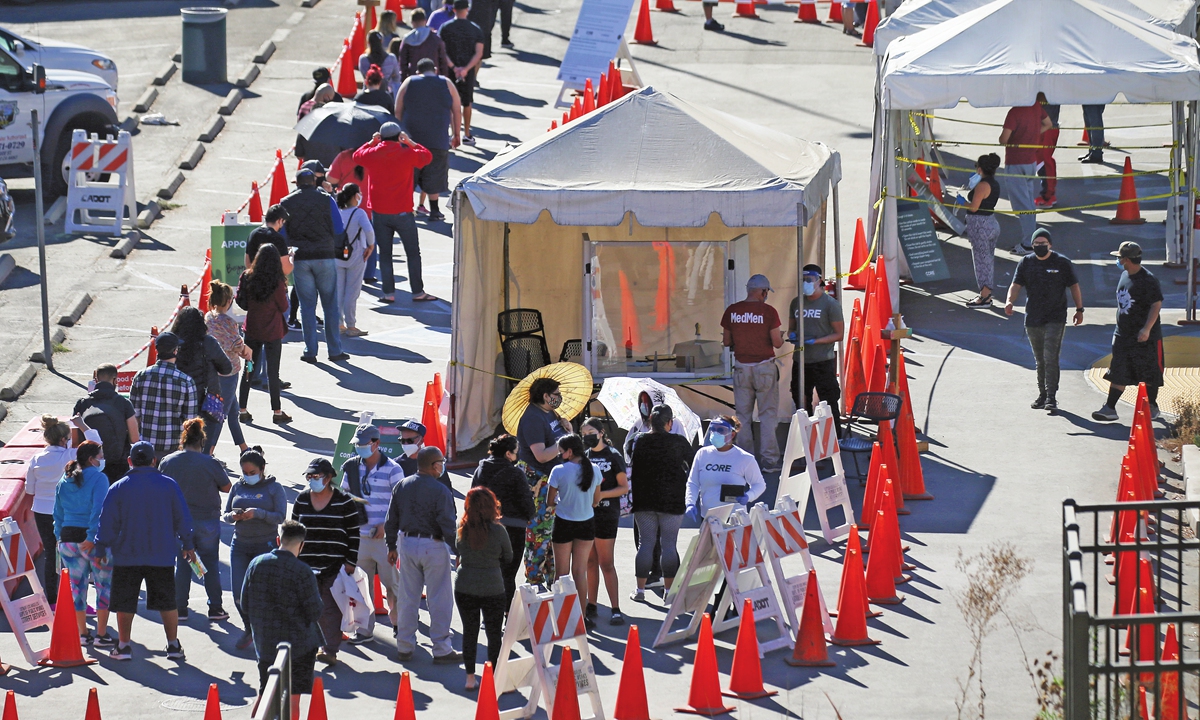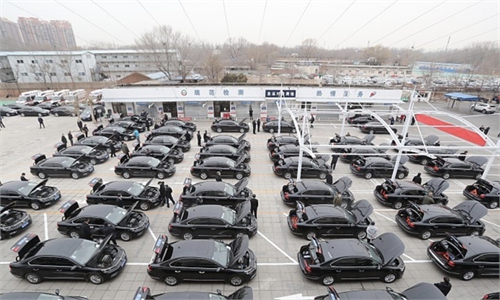‘When will it end?’: How a changing virus is reshaping scientists’ views on COVID-19
A moving target
Chris Murray, a University of Washington disease expert whose projections on COVID-19 infections and deaths are closely followed worldwide, is changing his assumptions about the course of the pandemic.

A new consensus is emerging among scientists, according to Reuters interviews with 18 specialists closely tracking the pandemic or working to curb its impact. Many described how the breakthrough late in 2020 of two vaccines with around 95 percent efficacy against COVID-19 had initially sparked hope that the virus could be largely contained, just like measles has been. But, they say, data in recent weeks on new variants from South Africa and Brazil have undercut that optimism. They now believe that SARS-CoV-2 will not only remain with us as an endemic virus but will likely cause a significant burden of illness and death for years to come.
As a result, the scientists said, people could expect to continue taking measures such as routine mask-wearing and avoiding crowded places during COVID-19 surges, especially for people at high risk.
Even after vaccination, "I still would want to wear a mask if there was a variant out there," Dr Anthony Fauci, chief medical advisor to US President Joe Biden, said in an interview.
"All you need is one little flick of a variant [sparking] another surge, and there goes your prediction" about when life gets back to normal.
Some scientists, including Murray, acknowledge that the outlook could improve. The new vaccines still appear to prevent hospitalizations and death even when new variants are the culprits. Many vaccine developers are working on booster shots and new inoculations that could maintain a high level of efficacy against the variants.
Worse than flu
Murray said if the variant found in South African, or similar mutants, continue to spread rapidly, the number of COVID-19 cases resulting in hospitalization or death this coming winter could be four times higher than the flu. The rough estimate assumes a 65 percent effective vaccine is given to half of a country's population. In a worst-case scenario, that could represent as many as 200,000 US deaths related to COVID-19 over the winter period. His institute's current forecast, which runs to June 1, assumes there will be an additional 62,000 US deaths and 690,000 global deaths from COVID-19 by that point. The shift in thinking among scientists has influenced more cautious government statements about when the pandemic will end.
Britain said on February 22 that it expects a slow emergence from one of the world's strictest lockdowns, despite having one of the fastest vaccination drives.
US government predictions of a return to normalcy have been repeatedly postponed, most recently from late summer to Christmas, and then to March 2022.
Israel issues "Green Pass" immunity documents to people who have recovered from COVID-19 or been vaccinated.
The documents are only valid for six months because it is not clear how long immunity will last.
'Scientific whiplash'
Early in the pandemic, leading scientists warned that the virus could become endemic and "may never go away," including Dr Michael Ryan, head of the World Health Organization's emergencies program. Yet they had much to learn, including whether it would be possible to develop a vaccine against the virus and how quickly it would mutate. Would it be more like measles, which can be kept almost entirely at bay in communities with high rates of inoculation, or flu, which infects millions globally each year?
A breakthrough came in November. Pfizer Inc and its German partner BioNTech SE as well as Moderna Inc said their vaccines were around 95 percent effective at preventing COVID-19 in clinical trials. A few of the scientists Reuters interviewed said even in the wake of those results, they hadn't expected the vaccines to wipe out the virus. But many said that the data raised hope within the scientific community that it would be possible to virtually eliminate COVID-19 if only the world could be vaccinated quickly enough.
"We didn't necessarily expect such high-efficacy vaccines to be possible in that first generation," said Azra Ghani, chair in infectious disease epidemiology at Imperial College London.
In late December 2020, the UK warned of a new, more transmissible variant that was quickly becoming dominant in the country.
Around the same time, researchers learned about the impact of the faster-spreading variants in South Africa and Brazil. In late January, Novavax's clinical trial data showed its vaccine was 89 percent effective in a UK trial, but just 50 percent effective at preventing COVID-19 in South Africa.
That was followed a week later by data showing the AstraZeneca PLC vaccine offered only limited protection from mild disease against variant found in the South African.
Shane Crotty, a virologist at the La Jolla Institute for Immunology in San Diego, described it as "scientific whiplash." In December 2020, he had believed it was plausible to achieve so-called "functional eradication" of the coronavirus, similar to measles.

People line up to be tested for COVID-19 in Lincoln Park, Los Angeles, California, the US. The number of coronavirus cases in the US tops 13.5 million on November 30, 2020. Photo: VCG
Murray had until recently been hopeful that the discovery of several effective vaccines would help countries achieve herd immunity. But in February, data from a vaccine trial in South Africa showed not only that a rapidly-spreading COVID-19 variant could dampen the vaccine's efficacy, but it could also destroy the natural immunity in previously infected people. "I couldn't sleep" after seeing the data, Murray, director of the Seattle-based Institute for Health Metrics and Evaluation, told Reuters. "When will it end?" he asked himself, referring to the pandemic. He is currently updating his model to account for variants' ability to evade natural immunity and expects to provide new projections as early as this week.A new consensus is emerging among scientists, according to Reuters interviews with 18 specialists closely tracking the pandemic or working to curb its impact. Many described how the breakthrough late in 2020 of two vaccines with around 95 percent efficacy against COVID-19 had initially sparked hope that the virus could be largely contained, just like measles has been. But, they say, data in recent weeks on new variants from South Africa and Brazil have undercut that optimism. They now believe that SARS-CoV-2 will not only remain with us as an endemic virus but will likely cause a significant burden of illness and death for years to come.
As a result, the scientists said, people could expect to continue taking measures such as routine mask-wearing and avoiding crowded places during COVID-19 surges, especially for people at high risk.
Even after vaccination, "I still would want to wear a mask if there was a variant out there," Dr Anthony Fauci, chief medical advisor to US President Joe Biden, said in an interview.
"All you need is one little flick of a variant [sparking] another surge, and there goes your prediction" about when life gets back to normal.
Some scientists, including Murray, acknowledge that the outlook could improve. The new vaccines still appear to prevent hospitalizations and death even when new variants are the culprits. Many vaccine developers are working on booster shots and new inoculations that could maintain a high level of efficacy against the variants.
Worse than flu
Murray said if the variant found in South African, or similar mutants, continue to spread rapidly, the number of COVID-19 cases resulting in hospitalization or death this coming winter could be four times higher than the flu. The rough estimate assumes a 65 percent effective vaccine is given to half of a country's population. In a worst-case scenario, that could represent as many as 200,000 US deaths related to COVID-19 over the winter period. His institute's current forecast, which runs to June 1, assumes there will be an additional 62,000 US deaths and 690,000 global deaths from COVID-19 by that point. The shift in thinking among scientists has influenced more cautious government statements about when the pandemic will end.
Britain said on February 22 that it expects a slow emergence from one of the world's strictest lockdowns, despite having one of the fastest vaccination drives.
US government predictions of a return to normalcy have been repeatedly postponed, most recently from late summer to Christmas, and then to March 2022.
Israel issues "Green Pass" immunity documents to people who have recovered from COVID-19 or been vaccinated.
The documents are only valid for six months because it is not clear how long immunity will last.
'Scientific whiplash'
Early in the pandemic, leading scientists warned that the virus could become endemic and "may never go away," including Dr Michael Ryan, head of the World Health Organization's emergencies program. Yet they had much to learn, including whether it would be possible to develop a vaccine against the virus and how quickly it would mutate. Would it be more like measles, which can be kept almost entirely at bay in communities with high rates of inoculation, or flu, which infects millions globally each year?
A breakthrough came in November. Pfizer Inc and its German partner BioNTech SE as well as Moderna Inc said their vaccines were around 95 percent effective at preventing COVID-19 in clinical trials. A few of the scientists Reuters interviewed said even in the wake of those results, they hadn't expected the vaccines to wipe out the virus. But many said that the data raised hope within the scientific community that it would be possible to virtually eliminate COVID-19 if only the world could be vaccinated quickly enough.
"We didn't necessarily expect such high-efficacy vaccines to be possible in that first generation," said Azra Ghani, chair in infectious disease epidemiology at Imperial College London.
In late December 2020, the UK warned of a new, more transmissible variant that was quickly becoming dominant in the country.
Around the same time, researchers learned about the impact of the faster-spreading variants in South Africa and Brazil. In late January, Novavax's clinical trial data showed its vaccine was 89 percent effective in a UK trial, but just 50 percent effective at preventing COVID-19 in South Africa.
That was followed a week later by data showing the AstraZeneca PLC vaccine offered only limited protection from mild disease against variant found in the South African.
Shane Crotty, a virologist at the La Jolla Institute for Immunology in San Diego, described it as "scientific whiplash." In December 2020, he had believed it was plausible to achieve so-called "functional eradication" of the coronavirus, similar to measles.



